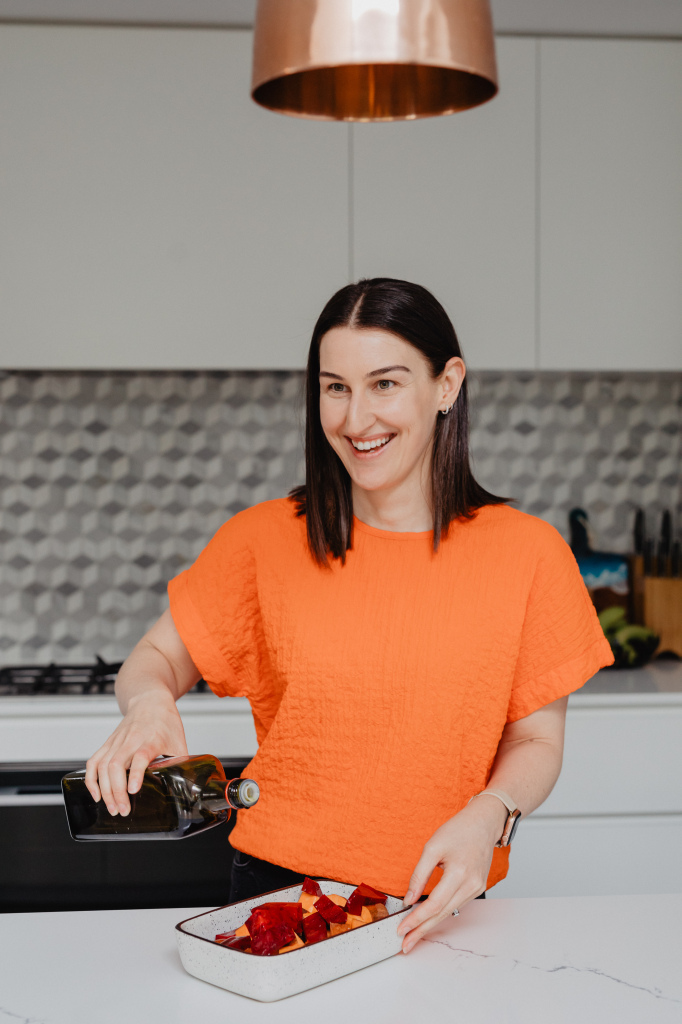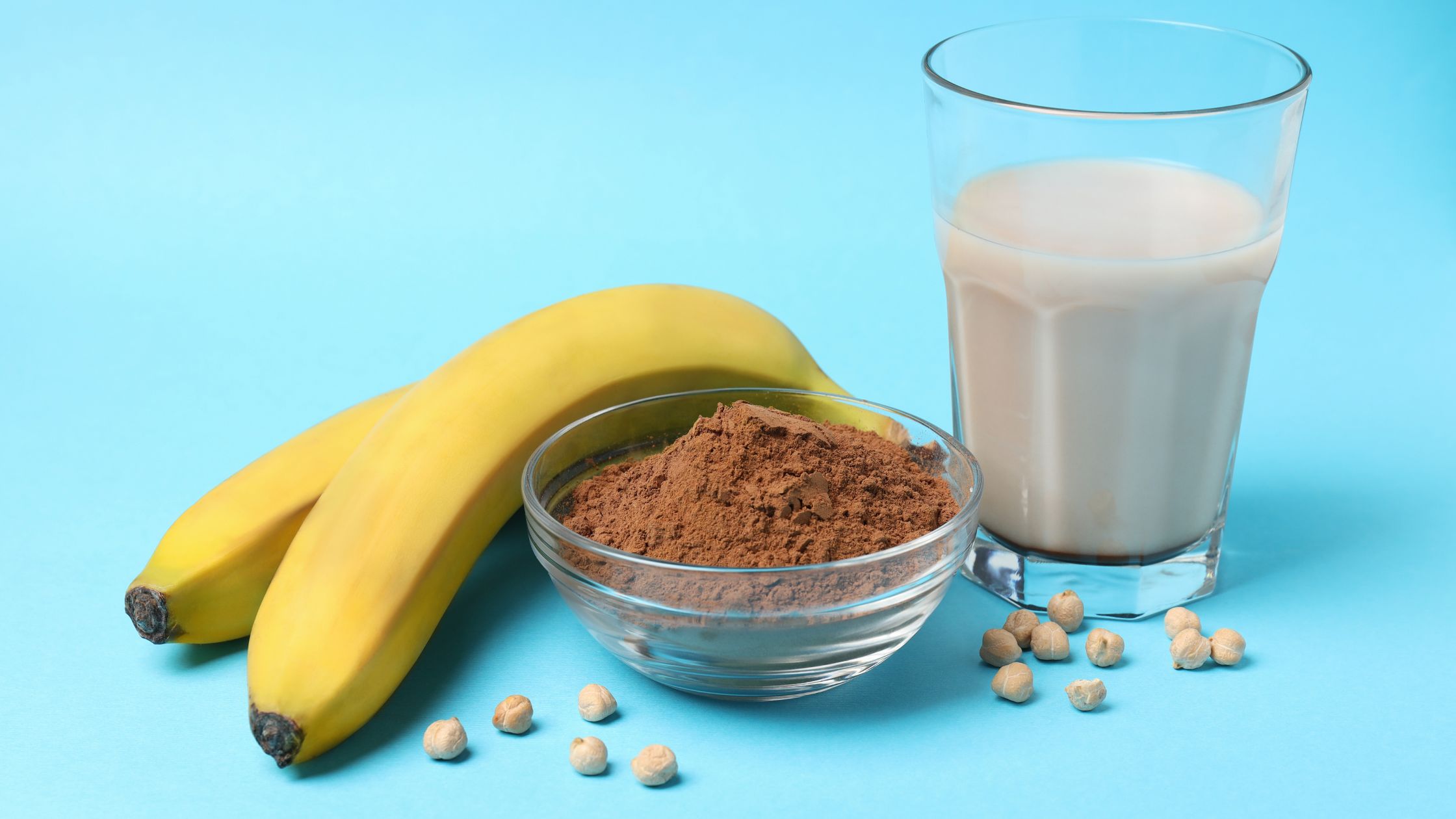Why most women are still getting sports nutrition wrong
After more than a decade working with women on their health and fitness goals, I can tell you this: most aren’t confused because they’re lazy or unmotivated. They’re confused because there’s too much information and not enough context.
Somewhere between the ‘train fasted to burn fat’ crowd and the ‘eat 300 grams of protein a day’ advice, the nuance disappeared.
And for women – especially those juggling work, kids, and hormones – that nuance matters.
Every week, I see women trying to train like 25-year-old blokes from a sports-science study, wondering why they’re exhausted, hungry, or stuck.
Sports nutrition for women isn’t about eating less; it’s about fueling your body so it performs, recovers, and adapts.
Table of Contents
- Should You Train Fasted?
- How to Eat Before (and After) You Train
- Protein & Muscle Building Basics
- Fueling for Endurance — Half-Marathon and Beyond
- Women, Hormones & Recovery
- Getting Started — Your Next Step
Should You Train Fasted?
You’ve probably heard that training on an empty stomach burns more fat.
The reality: your body first burns glycogen – the carbohydrate stored in your muscles – before it taps into fat. So unless you’re training for two hours at low intensity, you’re mostly running on glycogen, not stored fat.
More importantly, women’s bodies react differently to fasting and exercise stress.
That doesn’t mean you can’t do a light walk or gentle yoga before breakfast – those are fine. But if you’re lifting, doing HIIT, or running, fuel first.
➡️ Deep dive: A Sports Nutritionist’s Take on Training Fasted →
Bottom line:
You’ll perform better and recover faster when you eat before you train – especially if you’re a woman.
How to Eat Before and After You Train
If you’re showing up for your workouts but still feeling flat, under-recovered, or hangry, odds are your fuelling’s off.
The fix usually isn’t another supplement – it’s timing.
Pre-Workout: What to Eat (and When)
Think of your pre-workout snack as a spark plug. You don’t need a full meal, but you do need some quick energy.
The goal: a small, low-fibre, high-carb snack about 30 minutes before training.
Try:
- ½ banana or 1–2 dates
- A couple of rice cakes with a thin spread
- 1 slice of toast with honey or jam
If you trained more than two hours after your last meal, this snack is non-negotiable.
Otherwise, if you ate a balanced meal (think lean protein + carbs + some fat) within that window, you’re likely fine to skip it.
➡️ Read more: Should I Eat Before Training? →
Post-Workout: Recovery Nutrition
Your post-workout meal is where repair happens.
Aim to eat within 60 minutes of finishing – ideally something that combines:
- Protein (≈ 20–30 g) for muscle repair
- Carbohydrates to replenish glycogen stores
- Fluids + electrolytes for rehydration
Example: smoothie with milk, protein powder, banana and a tablespoon of nut butter; or a chicken and rice bowl.
➡️ Deep dive: Nutrition to Build Muscle →
The Perth Factor
If you’re training in Perth’s heat, hydration becomes just as important.
Add electrolytes on long sessions (>90 min) or sweaty days, and include extra fruit or starchy carbs with meals to replace glycogen used during training.
Local tip: Many Perth gyms and running groups start early – if you’re training before sunrise, prepare your snack the night before. That tiny bit of planning can make a huge difference in energy and recovery.
➡️ Considering a tailored plan? Book a 1:1 Nutrition Appointment → to fine-tune your pre- and post-training fuel for your goals.
Protein & Muscle-Building Basics
Forget the old myth that strength training will “bulk you up.”
What it really does — when paired with the right nutrition — is build lean muscle, improve metabolism, and make you feel stronger in your own skin.
How Much Protein Do Women Actually Need?
Somewhere between 1.2 – 1.6 grams of protein per kilogram of body weight per day is ideal for active women.
(For a 60 kg woman, that’s 72–120 g per day.)
Spread it across your day – not just one post-workout shake. Muscle synthesis happens in small windows throughout the day.
Why Consistency Beats Perfection
You don’t need to track macros to the gram. Focus on getting protein at each meal and eating enough overall.
Under-eating is the most common mistake I see in Perth women trying to get fitter — especially those doing morning training and living on coffee till lunch.
➡️ Explore: Nutrition to Build Muscle →
➡️ If you need a clear framework for balancing meals and progress without restriction, join Worth Your Weight — my signature program designed for women who want results that last.
Fueling for Endurance — Half-Marathon and Beyond
Long runs and endurance training are where nutrition becomes make-or-break.
It’s not just about stamina on race day — it’s about avoiding the mid-run wall, the “I-can’t-finish” crash, and the week-long recovery slump after.
Before the Run
Eat your main meal two hours before a long run:
- Carbohydrate-rich (porridge, toast with honey, or rice with eggs)
- Low in fat and fibre
- Hydrated — aim for at least 500 mL of water beforehand
If you’re running early and can’t stomach a full meal, go for a light snack (banana, dates, or toast) 30 minutes before.
➡️ Read more: Nutrition for a Half Marathon →
During the Run
Once your session lasts longer than 90 minutes, your glycogen stores start to run dry.
Fuel every 30 minutes after that mark — gels, lollies, or dried fruit are all fair game.
Don’t wait until you’re tired to start fueling; by then it’s too late.
After the Run
Pair protein and carbs within an hour: think eggs on toast, yoghurt with fruit, or a smoothie.
Add electrolytes if you’re drenched in sweat — Perth humidity can surprise you.
Training for something specific?
You can book a 1:1 session to tailor your endurance nutrition plan — we’ll map fueling, hydration, and recovery around your weekly runs so you can perform without burning out.
➡️ Book a 1:1 Sports Nutrition Consult →
Getting Started – Building Your Personal Sports Nutrition Plan
You don’t need to overhaul your diet overnight. Start with three basics:
- Fuel before you train. Small carbs before early sessions make a world of difference.
- Prioritise protein daily. Think “one palm of protein at every meal.”
- Eat enough – consistently. Under eating is the fastest way to stall your progress and mess with hormones.
From here, everything can be fine-tuned – whether you’re chasing a faster 10k, lifting heavier, or finally wanting to feel strong instead of drained.
➡️ Explore your next step:
- 1:1 Sports Nutrition Appointments — individualised plans built around your training, hormones, and schedule.
- Worth Your Weight — my signature small-group program blending performance and sustainable weight management.
Want to Learn More?
Check out these related reads:
- Should I Eat Before Training?
- Nutrition to Build Muscle
- A Sports Nutritionist’s Take on Training Fasted
- Nutrition for a Half Marathon
REFERENCES & READING
- Larrosa, M., Gil-Izquierdo, A., et al. (2024). Nutritional strategies for optimizing health, sports performance and recovery for female athletes and other physically active women: A systematic review. Nutrition Reviews, 83(3), e1068. https://doi.org/10.1093/nutrit/nuad1068
- Mountjoy, M., Sundgot-Borgen, J., et al. (2022). Recommendations and nutritional considerations for female athletes. Sports Medicine, 52(10), 1871-1893. https://doi.org/10.1007/s40279-022-01700-8
- Helm, M. M., McGinnis, G. R., & Basu, A. (2022). Impact of nutrition-based interventions on athletic performance during menstrual cycle phases: A review. Nutrients, 14(9), 1786. https://doi.org/10.3390/nu14091786
- Jäger, R., Kerksick, C. M., Campbell, B. I., et al. (2017). International Society of Sports Nutrition position stand: Protein and exercise. Journal of the International Society of Sports Nutrition, 14, 20. https://doi.org/10.1186/s12970-017-0177-8
- Logue, D., Madigan, S. M., Heinen, M., et al. (2020). Fueling the female athlete: Bridging the gap from recommendations to changing behaviour. Sports Science Exchange, 126, 1–6.
- Wohlgemuth, K. J., Smith-Ryan, A. E., Kerksick, C. M., et al. (2021). Sex differences and considerations for female-specific nutritional strategies: A narrative review. Journal of the International Society of Sports Nutrition, 18(1), 27. https://doi.org/10.1186/s12970-021-00422-8

Jade Harman is a Clinical Nutritionist, educator, and speaker helping people make sense of nutrition. With a Bachelor’s degree in Nutritional and Dietetic Medicine and experience supporting more than 500 clients, she’s seen firsthand how misinformation can derail good habits. Jade doesn’t do fads or guilt – just practical advice that works in real life with real people. You can find out more about Jade here.

+ show Comments
- Hide Comments
add a comment